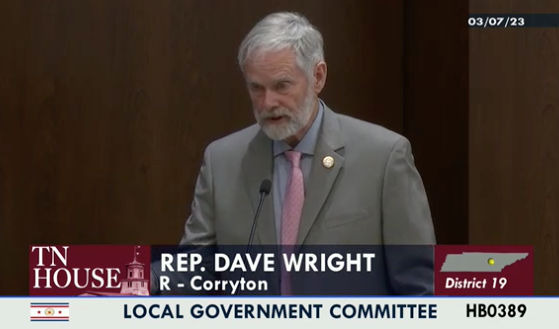A bill that would have allowed members of county and municipal governing bodies to attend meetings electronically failed in the House Local Government Committee last week on a voice vote.
Two members of the committee voiced concerns over the bill, HB 389.
Commissioner dealing with family emergency may not ‘mentally there’
Rep. Clay Doggett, R-Pulaski, noted that the bill allowed members to virtually attend when they were dealing with a family or medical emergency, had been called into military service or during inclement weather. In such instances, he said, someone might not be “mentally there” enough to perform their duties.
“I can only imagine being in a family emergency and then trying to dial in on my phone to be a vote on the budget for my county commission or to take up a matter … that involves our local sheriff department or law enforcement… I think it could be a dangerous precedent,” Doggett said.
Rep. Jay Reedy, R-Erin, said his wife is a county commissioner, but just like he is required to be at the state legislature to appear before the public to vote and do business, he expected his county commissioner to meet in person, not be somewhere on the phone dealing with another issue and taking a vote.
“I’m expected to be here with these people in the auditorium to see me testify for or against a piece of legislation. It’s the same thing as I expect from my county commissioner.”
Doggett made a motion to send the bill to summer study to examine the possibility further, but a vote on that motion failed.

Rep. Dave Wright of Knox County explains how a bill would allow a county commission experiencing a family or medical emergency to attend a county commission meeting by phone or video.
Rep. Dave Wright, R-Corryton (which is part of Knox County) defended his bill, saying it had been amended to make clear that the governing body could adopt by a resolution whether or not it would allow members to participate electronically, making it permissive to the governing body.
He also said that the bill limited a member to participating remotely to only twice a year.
He gave an example of a Knox County commissioner whose father lived in California and had a heart attack. The bill would allow the county commissioner to attend to his father out of state, saying he could still be of sound mind to contribute to the county commission meeting and represent his constituents.
Similar electronic meetings bill failed in 2021
The bill is a revival of a bill that failed in 2021 by Wright and State Sen. Richard Briggs, R-Knoxville. Both lawmakers have said the idea for the bill came about after a Knox County commissioner had surgery that, during recovery, prevented him from being able to leave his home to attend a county commission meeting.
Tennessee Coalition of Open Government opposed the bill and testified against it. TCOG argued that the phrase “family or medical emergency” was vague, overly broad and could be subject to abuse and unfair application. The use of the term “emergency” also didn’t match the initial reason for the bill, which was a person who was experiencing a temporary disability, such as immobility after recovering from surgery.
TCOG also noted that during the COVID-19 pandemic, hybrid meetings — in which some members participated by phone and others were in person — were often the hardest for members of the public to follow, particularly when multiple people were on the phone. Also, during COVID-19, it became clear that many local governing bodies aren’t equipped with technology such as big screens in their meeting rooms that allow members participating electronically to be clearly heard and seen.
While the bill limited electronic participation to no more than 20% of the governing body at any given meeting, this could still result in three people on a 15-member governing body calling in by phone on any given issue. The bill did not require that members participating electronically be connected for the entire meeting.




